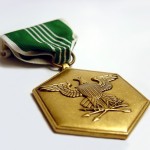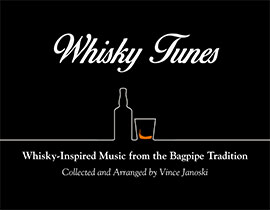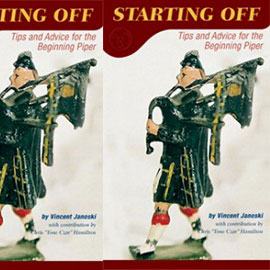Cracking the Millstone II: Long Live Bagpipe Competitions!
 Go back and read Part I: Bagpipe Competitions are Dead
Go back and read Part I: Bagpipe Competitions are Dead
The merry-go-round goes round and round… The sheer monotony of bagpipe competition here in the US can wear you down after a while. As I mentioned in Part I of this piece, Bill Livingstone once likened competition to a “millstone,” and he’s right. Lots of great, interesting stuff goes in, only to be crushed into a homogeneous powder.
But bagpipe competitions are not dead in the sense of obsolescence, they are dead in the sense that what they produce is lifeless and boring. And it is mainly due to the restrictions we face in preparation as bagpipers in order to compete successfully. We currently play for ourselves, not an audience, in a way that churns out a pre-planned product. If it continues like that, eventually these restrictions will bring about the true death of the form. If bagpipe competitions are to flourish, they must grow. And to do that they must grow beyond the restrictions rooted in our tired format and break the millstone that grinds out the same thing over and over.
As we develop and grow as bagpipers, and eventually venture onto the solo competition boards, there is reward that awaits us. Quality feedback, one hopes, can propel us into further learning. Wins and medals give us the feedback to let us know what we’re doing right and good feedback on scoresheets (one hopes) lets us know what we might need to improve on. Trouble is, as your playing quality grows, so too must the payoff or feedback. The US is rife with folks who reach the professional ranks of solo piping only to be faced with a wasteland of performance opportunity and competitions that do nothing but give them the same kind of reward they received when they were struggling pipers in the Grade 4. It is not uncommon for these players to vanish from the solo boards entirely. Right now it is just points and medals and some scoresheet feedback by the same judges for everyone. That’s it. In some respects, competition is a lot like the standard tests we took in school.
States all over the USA have always used standard tests to gauge the progress of their public schools. The scores allegedly determine how well the kids are taught basic skills. The curriculum of the school is thus designed to teach these skills. Current bagpipe competition is similar. Bagpipe competition is like a standard test to see how well you’ve been taught the basic skills required: march, strathspey, reel, piobaireachd. All your instruction and practice is thus designed to perfect those skills. What we don’t see are standard school tests that gauge other skills that are just as important for success in our modern world as we move beyond those basic skills. So too is your ability as a piper to move beyond the basic skills and find a unique groove or bring out distinctive “color” and “mood” in a piece of music as important as your skill at playing a clean taorluath. Yet there really is no “test” for that in our modern competition scheme. The decades of bagpipe competition here in the US have seen much of the more expressive, subjective aspects of music-making give way in favor of formalization and structure.
So how do we push it all forward? The changes must come from the inside and work their way outward. Everywhere we look we see the innovation and progress that occurs when controls are loosened. Far from bringing chaos, letting go of some of that formality and rigid structure in bagpipe competition just might bring in the growth that is needed. New competition formats need to challenge the player and spark a change in their relationship or attitude toward competition. The event or events must also communicate their intention and mission to both competitor and audience. What kind of mission does our current battery of US solo competitions communicate? Think about it.
So here is the template. A great competition format/circuit would possess the following qualities:
- Variety—Opportunity to express strengths and musical range
- High stakes—High significance/high reward
- Authenticity—Reward for personal musical statement or style
- Credibility—Official support and regard of competitors, organizers, and/or governing organizations
How many of our typical eastern competitions possess these qualities? Without much tinkering, one can create a revamped circuit with content that captures all four of them. MSRs and piobaireachd have their place, but other opportunities that capture the above qualities would automatically give pipers a chance to: 1) develop their musical skills beyond the “standard test”; 2) leverage and enhance their personal strengths; and 3) provide greater audience and participant interest.
“Variety is the spice of life,” it’s said. It would not be hard to introduce these kinds of changes by simply following the examples of existing international events. The solo Highland piping competitions at the Lorient Interceltique festival requires players to play sets in three different styles with seemingly no other requirements. Players must compete with an Irish set, comprised of Irish tunes; a Scottish set, comprised of tunes from the Scottish tradition; and a Breton set, comprised of traditional Breton tunes. These competitions coexist with the standard MSR and piobaireachd.
The Donald MacLeod Memorial contests, held each year in “wee Donald’s” home of Stornaway on the Isle of Lewis, requires invitees to play music composed by Donald MacLeod himself, including piobaireachd.
The Metro Cup, held in Newark, New Jersey is well known for its free-form medley contest, delighting the attentive yearly crowd with a few surprises over the years.
I daresay that all of these contests possess all of my above-mentioned qualities. But these are not just great opportunities for top players, they are models on how to create great performance opportunities for the bagpiping body politic. Think about what these types of contests require of the player. To take a wild guess: You would need to hone your musical skills; you would need to experiment; you would need to explore a bit of “personal style.” Think about what these types of contests require of you as a listener. You are exposed to a level of variety that is just not seen all that much in our typical competition scheme.
Incorporating this variety is not without its pitfalls. Some of the formality and tight controls that currently exist for both competitor and adjudicator would need to change. (I can already hear the outcries.) But far from being a confused mess that raises the specter of a lower piping standard, offering changed formats of competition would enhance participation, expand the audience, and introduce some much needed variety while providing higher goals for striving soloists.
So, here are a couple of ideas to get the gears in the brain box moving:
Parallel Circuits—Competition points awarded separtately in different forms. Right now in the eastern US points are awarded separately in piobaireachd and awarded combined with everything else in two separate lists. We obviously recognize that some players have differing skills sets and may be proficient in ceol mor while perhaps not being as strong in the light music and vice versa. The divergent lists recognize this and one can make a decision as a player to perhaps only play piobaireachd and be rewarded just the same. But what if we carried this idea to its natural next level and award points separately in different forms?
Contests would vary their offerings with a mix of formats across the circuit, giving players ample opportunity to delve into different types of music. For example, one competition could offer a 6/8 march and a jig competition; while another could offer the more standard MSR and piobaireachd. Another could mix it up even further and offer a freeform medley and an original arrangement/composition contest. The rewards for these types of contests would initially come in the form of separate overall lists for these types of contests.
Each offering would provide a truer chance for players to flex their musical muscle, offering a chance for wins and success in ways that are not offered currently. For example: a series of jig competitions could bring an overall prize that leverages a particular player’s strength. Right now, a soloist could win every hornpipe/jig competition offered but still finish below the top of the overall standings because their MSR or piobaireachd playing might not be at an equal level. The way the system is now, that player is effectively punished for his/her strength. Doing a particular thing really well, perhaps better than anyone else, just isn’t good enough. Success breeds success. But constant lack of any reward for that success is going to send a clear message after a while.
The Scottish Model—Tiered events, where some competitions are considered more important than others, would award greater weight to some wins and allow qualification to compete in future higher prestige events. Specific solo events would act as stepping stones forward in a “championship level” system that coexists with the current system. The ultimate payoff is extra excitement and enthusiasm on the part of competitors with something more to shoot for. The higher stakes of the events or system would increase the level of preparation and (hopefully) participation. Competitors would achieve a truer measure of their standing in such a system since only the best and most serious players would make it forward. Not only that, it would feed changes from the inside on the overall culture of what we do, changing the way we perceive competition as competitors as well as what they stand for. The logistics of such a system could culminate in a final event where all who qualified by their performances in earlier events would compete. That event sends a clear message to both competitor and audience of its importance. Right now, we have solo bagpiping events in some cases, shoved as far away as possible to the back of the dustiest, dirtiest part of the grounds. What kind of message does that send?
No Such Thing as a Bad Idea
The specifics of these kinds of changes are truly limitless. And yes, they bring a host of puzzling issues that would need to be addressed. But it all must start with ideas and will. In some respects, US bagpiping has never been stronger. The level of enthusiasm for this little thing we do has never been greater. Because of this, there is no better time to try out some big ideas and make some drastic changes than now. Some may falter and fail. Others might succeed wonderfully. Others might be simply wrong. But the art and craft of US Highland bagpiping can handle it. And the point is that they are tried in some way. Even a millstone must continually turn in order to do its job. No innovation or progress ever happens when things are standing still.
For more ideas on “hacking” bapgipe competitions, click the links below for past posts on the topic.
The Path to Better Pipe Band Competitions
-
Ropeburnt
-
pipervin
-
Joshua
-
Ropeburnt
-
 Pipehacker
Pipehacker








